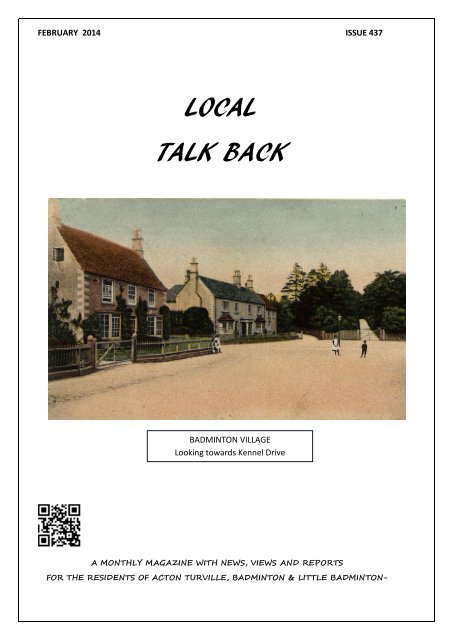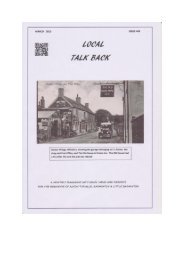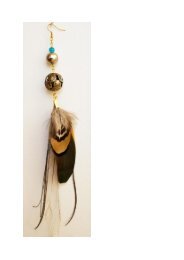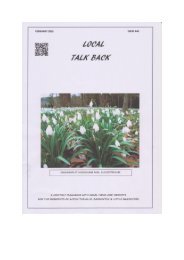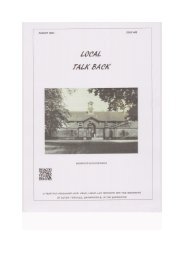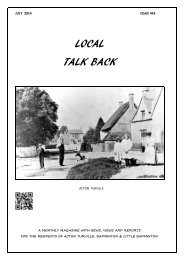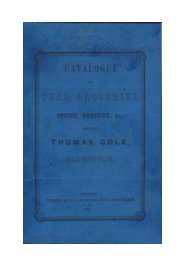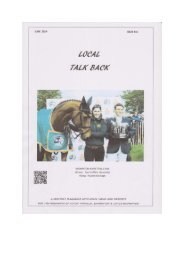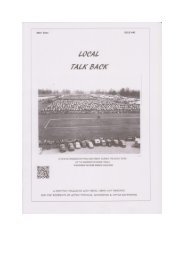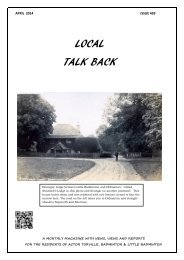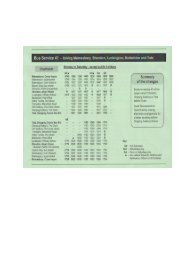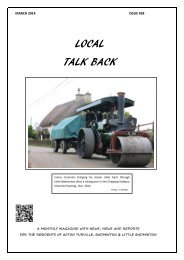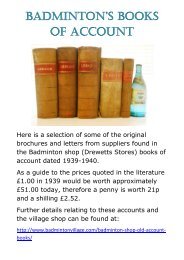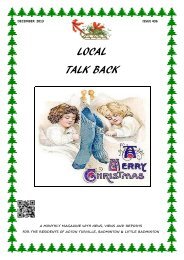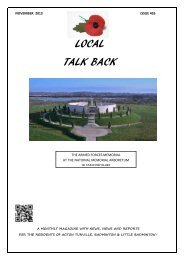Create successful ePaper yourself
Turn your PDF publications into a flip-book with our unique Google optimized e-Paper software.
FEBRUARY 2014 ISSUE 437<br />
<strong>LOCAL</strong><br />
<strong>TALK</strong> <strong>BACK</strong><br />
BADMINTON VILLAGE<br />
Looking towards Kennel Drive<br />
A MONTHLY MAGAZINE WITH NEWS, VIEWS AND REPORTS<br />
FOR THE RESIDENTS OF ACTON TURVILLE, BADMINTON & LITTLE BADMINTON-
We send condolences to David, Andrew and Alison, children of Melvyn Saunders who passed away<br />
recently. He had been alone since losing his wife Elsie.<br />
Melvyn could often be seen walking his little dog around Acton Turville. He had enjoyed<br />
going along to the Luncheon Club and meeting up with his friends.<br />
We were also sorry to hear that Paul Monyard had passed away. Paul was very well known<br />
being the landlord/proprietor of The Compass Inn, Tormarton, following in his father’s footsteps.<br />
As well as running the very busy hotel Paul organised golf tournaments and golf trips abroad. He will<br />
be greatly missed and our thoughts are with Penny, Rupert, Charlotte and Paul’s mother who has<br />
lived in Acton Turville for many years.<br />
February 4 th & 18 th<br />
JUBILEE ROOM, BADMINTON<br />
HALL<br />
7.30-9.30pm every other Tuesday<br />
throughout the winter and spring<br />
We are an informal group where we have the space for everyone to do their own craft –<br />
cardmaking, lacemaking, scrapbooking, beading, quilling, doll-making, knitting, crochet etc. –<br />
share ideas and get inspiration.<br />
No membership fees, just £2 on the night - 7.30 – 9.30pm<br />
We also arrange professional demonstrations and will go out on visits of interest.<br />
Ring for information : Yvonne ( 01454) 218267 L/BADMINTON – Heather 218617 BADMINTON -<br />
Helen 218792 ACTON TURVILLE
_____________________________________________________________________________<br />
_FEBRUARY 2014 <strong>LOCAL</strong> <strong>TALK</strong><strong>BACK</strong> ISSUE 437__<br />
EDITORIAL<br />
Hello everyone we are back again in another new year. Christmas seems a long time ago now that we are in<br />
2014. We hope you all had a good time and are now looking forward to what this year can offer. First, we must<br />
say that we feel very bemused by the weather. What a winter season so far! The awful flooding in many parts<br />
of the country is never far from our thoughts as it is on the news every night with<br />
people on the Somerset Levels being stranded in their homes for weeks on end. It<br />
was terrible that two families in Badminton have had their houses flooded for the<br />
second year and with no river anywhere near us. It has been comparatively mild<br />
and the flowers are all confused, with a hedge of Forsythia flowering in<br />
December, Pinks in a tub covered in new flowers , then January 22 nd a pair of<br />
Collared doves nest building. They were fascinating to watch as they selected the<br />
twigs for their nest, rejecting some and then finding the right one.<br />
We visited Marshfield for a little bit of shopping and afternoon tea. There are<br />
some interesting little shops selling a whole variety of goods. Country Stores<br />
and Vintage & Brown have quite a selection of gifts at very reasonable prices<br />
as well as furniture, ornaments, mirrors etc to brighten up any room in your<br />
home. We had delicious home-made cakes in Sweetapples Teashop in the<br />
main street. Lots of pretty floral materials decorate the room complimented<br />
by floral china, giving it a very cosy feel.<br />
We have been very pleased with the response we have been getting from some readers about articles in the<br />
Talkback, and especially for the story from Phyllis Salmon’s book about her childhood in Badminton. We<br />
know that it is being read in America, Australia and Spain because we send copies to readers in those countries.<br />
Also Wayne’s Badminton webpage - badmintonvillage.com – has taken the magazine to a wide range of<br />
readers. So we are in need of help from you in helping to fill the Talkback with interesting items. So please<br />
contact us if you would like to add any of your own news or memories.<br />
Last year we had some guest writers for the Editorial page, which was very successful, so we would like to ask<br />
again for volunteers to come forward to take over for one issue and write your own letter. Contact any one of us<br />
or Liz via the details below.<br />
Until Next Time -The Three Country Girls<br />
Sally Smith, Sandra Broomsgrove & Yvonne Nettles<br />
STOP PRESS<br />
After the donations page was printed we received a generous anonymous donation<br />
In memory of a loved one – Thankyou.<br />
Send articles to Liz, c/o The Estate Office, Badminton, South Glos, GL9 1DD, or ring Liz (mornings only)<br />
on 01454 218379 e-mail lizbarnesbpc@googlemail.com<br />
DATE FOR ARTICLES FOR MARCH ISSUE WILL BE 20 TH FEBRUARY<br />
Huntsman Tony Holdsworth with<br />
the Beaufort Hounds at The Lawn<br />
Meet, Ivyleaze, Acton Turville<br />
on 11 th January
MY ROYAL CONNECTIONS<br />
By Phyllis Salmon (nee Brown) autobiography written 1989<br />
This is about her childhood in Badminton from 1926<br />
PART 6<br />
The New Year came in; and to us children it was more or less the same.<br />
Sometimes we had snow in January or February, and of course, we made<br />
the usual snowman, and we would ask Mother to let us have the big black tea tray. We would take<br />
it into the field where there was a big bank then in turn we would use it as a toboggan, and had lots<br />
of fun as long as the snow lasted.<br />
When the spring came we loved to gather the primroses and violets that grew everywhere;<br />
along the hedgerows, the banks of the lanes and in the woods. We were always bringing them<br />
home; and on our window ledges you would find many jars of them. In those days there was no<br />
restriction on picking them, for there was nothing to kill them off like there was after the war when<br />
they sprayed the banks with weed killer. Then when more people had cars they came into the<br />
country and dug them up to take home for their gardens.<br />
We spent most of our time playing in the wood when we were young. There was always a<br />
baby to look after and I was ten when my youngest brother was the baby. When I got to the age of<br />
ten the work got harder and every day before going to school, I had to take a bucket upstairs, with a<br />
cloth and a jug of hot water to empty the slops. There was a chamber pot in each room that was<br />
used every night, for it was too far to go to the lavatory. I emptied them, swilled them out with the<br />
hot water, then dried them with the cloth. I then took the bucket and emptied it down the outside<br />
lavatory and swilled the bucket out, and that was one job done. I then helped to get the children<br />
washed and dressed for school and then got myself ready. We came home for dinner time – lunch<br />
time as they call it today. I would help get the meal, which would not be much, for we had a good<br />
dinner in the evening. It was then back to school. When I got home in the evening there was the<br />
washing up to be done from dinner time and then the table to be set for the meal. After we had it I<br />
would clear away and wash up. When that was done there was always a baby to nurse. Sometimes<br />
Mother would put the bay Welsh fashion into my arms, by wrapping the shawl around me after<br />
wrapping the baby in it and placing it in my arms, then she would fasten it with a safety pin to help<br />
hold it. I would nurse the baby for a long time like this. I smile when I think of the times I walked<br />
up and down our hall singing songs and hymns when it was too wet to go outside.<br />
On Saturday it was extra cleaning, and when I was about twelve I had to clean the children’s<br />
rooms out. Mother did her own bedroom, then the big living room had to be swept, dusted, and the<br />
floor scrubbed. It was big stone flags – all the houses had them. Mother cleaned the grates, the<br />
parlour, and passageway. I had the scullery to do. When my sister Edith was old enough she<br />
helped me, and Lilian looked after the baby. We all had to work when we were old enough, the<br />
boys did the yard. They also chopped the wood and helped Father do the gardening. Life was quite<br />
hard for boys and girls who were born at the beginning of a large family, but we knew no different,<br />
and it has done us no harm.<br />
By the time I left school I could manage to do anything, even the big washing day, which<br />
was always on a Monday. I did it many times when Mother was poorly. Not being very big, I had<br />
to stand on a box to get the clothes out of the big boiler.
My Royal Connections cont....<br />
There was a big mangle to wring them, and we used a washboard , which was called a<br />
rubbing board, every piece of clothing had to be rubbed clean on this. I used a rubbing board to do<br />
my washing after I got married, right up until I had my first washing machine in 1958, and I had<br />
been married for 16 years by then. The ironing was done by flat irons that were put on a rack in<br />
front of the fire, or on the red hot coals. They had to be cleaned so that the clothes didn’t get dirty.<br />
There was no electricity, we had lamps and candles for lighting.<br />
One day when we were at school there was great excitement and we were all told to leave<br />
class and go into the street, as one of the airships was due to fly over Badminton. We waited a little<br />
while, and then it came over. I shall never forget this gig shining airship in the sky. I think it was<br />
the R101, but I’m not sure, it could have been the R100.<br />
One of the things I liked more than anything was when my two older brothers left school<br />
and went out to work. One went on the same farm as Father, the other went into service as a boots<br />
boy, that meant he did all the odd jobs indoors. He came home to sleep, but had to go early to light<br />
the fires and clean the shoes. This brother was one of Mother’s favourites, and he had more<br />
privileges than the rest of us. One of them was going dancing. This was through a married couple<br />
who he worked with. They persuaded Mother to let them take him dancing on a Saturday night, and<br />
he became a good dancer. Every Saturday night there was a dance in the village. When the New<br />
Year fancy dress ball was held, Mother and Father dressed him as a golliwog and won first prize.<br />
He won a lovely man’s cardigan that exactly fitted Father.<br />
The reason I was glad my brothers had left school, was that I would have the job of taking<br />
Father and my brother Jim, their tea to the harvest fields in the summer. Father insisted I should<br />
take it, I think the real reason was that it would give me a break from the work at home. He could<br />
also rely on me to get there no matter where they were, and be on time for the tea break.<br />
Sometimes it could be as far away as three miles, along the road, across fields and farm tracks. I<br />
loved it when I got there and sat among the hay or corn having tea with Father and my brother for<br />
mother always put some in for me. How I loved the smell of new mown hay, and to be able to pat<br />
the horses while they rested. Sometimes I would be given a ride on one of their backs. After tea I<br />
would leave them to go home, and I would take my time, for I loved to watch the birds and see the<br />
rabbits at play. I could not resist picking the wild flowers that grew everywhere.<br />
Another worry for Mother was when any of us fell ill or were injured, for there was no<br />
national health service, and the doctor had to be paid. So she would attend to us herself and had a<br />
great many remedies to cure us. If we came out in a rash, they called it nettle rash, and she would<br />
send us to gather dead nettles, not the ones that sting. She would boil them and we would have to<br />
drink the tea and the rash would soon go. When we had a chesty cold she would rub it with goose<br />
grease saved from the goose we had at Christmas. If we had sore eyes or a sty on them they were<br />
bathed with cold tea, then vasaline rubbed on. When we had earache a drop of olive oil was put in,<br />
and a bit of cotton-wool. For toothache we had to bite on a clove. If we cut ourselves badly, or<br />
knocked our knees about, it was cleaned and iodine put on – goodness, didn’t it smart! One of the<br />
things I didn’t like was when we had chilblains; we were told to put our feet in the chamber pot<br />
before it was emptied. All these remedies didn’t do us any harm, and we all survived and are living<br />
to a ripe old age. Of course if Mother was doubtful she would send for the nurse. We had one or<br />
two bad accidents amongst us.<br />
To be continued.
ACTON TURVILLE CHURCH - 1853<br />
From a newspaper cutting dated 15 th October 1853<br />
This ancient church, which has been closed for several months, whilst the works of its<br />
restoration and enlargement have been in progress, was reopened, with the celebration of<br />
Divine Service on Thursday 6 th inst. The works have been of a very extensive and important<br />
character, comprising an entirely new roof and floor; the building of a new aisle and vestryroom<br />
on the north side; the rebuilding of the south porch; and the reconstruction of the whole<br />
interior. By these additions and alterations nearly four times the former amount of<br />
accommodation has been secured. The picturesque bell-turret, which has so long been an<br />
object of interest to the antiquarian, and is one of the most perfect specimens of its kind to be<br />
found in the country, has been carefully preserved. Two new windows also have been<br />
introduced, one with three lights, at the east end, and another with two lights in the west, in<br />
place of those which formerly disfigured the church. The east window is of stained glass. A<br />
new and appropriate font has likewise been substituted for the clumsy and unsightly font<br />
which existed before. It is made of Tormarton stone, of which material the pillars and arches<br />
which separate the aisle from the nave, and the corbels which support the open timber roof<br />
are composed. The chancel which has stall seats on each side, is paved with Minton’s<br />
encaustic tiles; and texts taken from the words of our Lord, are written at the top and base of<br />
the east window, and beneath the cornice of the roof.<br />
The above works have been executed by Mr Edmund Miller, builder of Seagry, under<br />
the direction of Mr T.H. Wyatt of Great Russell Street, London, architect for the diocese of<br />
Salisbury; and the result has been to exhibit evidences of ability and skill and judgment, not<br />
less satisfactory than those displayed in the restoration and enlargement of Tormarton church,<br />
six months ago by the same hands. The unfavourable weather necessarily prevented the<br />
attendance of many who had intended to take part in the proceedings of the day. But<br />
notwithstanding this drawback, between 30 and 40 of the clergy assembled with their friends<br />
at an early hour, in rooms provided for their reception near the church. The continued illness<br />
of the Duke of Beaufort frustrated his intention and wish of being present, but the Duchess,<br />
and Lady Blanche Dupplin, and the Ladies Henrietta, Emily, and Edith Somerset, with the<br />
Misses Damer, arrived at the Church from Badminton, a short time before the<br />
commencement of the morning service. At the appointed hour, the clergy having put on their<br />
gowns, walked in order towards the church, followed by the Rev. Canon Wordsworth and the<br />
Rev. Henry Ellison (both of whom had undertaken to preach upon the occasion) and were<br />
met at the churchyard gate by the Rector, the Rev. J.S.M. Anderson and his two Curates, and<br />
by the Rural Dean (the Rev. T.B. Coney) and the Churchwardens. They entered the south<br />
porch, and proceeding up the aisle, took their places in the chancel and other parts of the<br />
church which had been set apart for them. The prayers and lessons were read by the Rev.<br />
J.H.Morison, curate of Tormarton and Acton Turville; and parts of the service were chanted,<br />
and Psalms sung by the village choir, the congregation joining. The Communion Service was<br />
read by the Rector and the Rural Dean. Rev. Canon Wordsworth ascended the pulpit to<br />
preach. At the conclusion of the sermon the offerings of the people amounted to nearly £50<br />
Upon leaving the church, most of the members of the congregation repaired to an<br />
adjoining field where a spacious and handsome Indian tent of cruciform shape belonging to<br />
the Duke of Beaufort, and kindly lent by his Grace for the occasion, had been erected. It was<br />
boarded throughout and thus afforded in spite of two days continued rain, a safe and<br />
comfortable shelter to all who could be assembled within it.
ACTON TURVILLE CHURCH 1853 cont.....<br />
More than a hundred persons, among whom were the Duchess of Beaufort and her party, all<br />
the other visitors, lay and clerical, and as many of the farmers as were enabled to leave their<br />
daily occupations, then sat down to a luncheon provided by the Rector. A dinner was<br />
likewise given by him, in an adjoining house, to the members of the village choir, and others<br />
who had kindly assisted them on that day. The Rector acknowledged the debt of gratitude<br />
which he owed to his parishioners who had, in two separate vestries voted unanimously a<br />
2s 6d special rate for each of the churches of Tormarton and Acton Turville, and thus helped<br />
to restore, enlarge, and re-open both of them within six months. He also acknowledged the<br />
help which he had received from the Duke of Beaufort, from the Dowager Duchess, and from<br />
the Duchess who then honoured them with her presence, who in addition to another offering<br />
had presented a service of communion plate to the church of Acton Turville. Other like acts<br />
of kindness, from the Bishop of Chichester, whose diocese he had left; from the Bishop of<br />
Gloucester and Bristol into whose diocese he had now come; from his friends and<br />
neighbours who were then present, and from others who were absent in body but present in<br />
spirit. He did not deny that a heavy burden was still to be borne by him and that the works<br />
already accomplished, as well as others which remained to be done, entailed upon him great<br />
anxiety and constant labour. The rector then called upon Mr Markland, who had been among<br />
the first to cheer him by his spontaneous help, and had come that day from Bath to witness<br />
the completion of his second church. The acknowledgement was made by Mr Markland in<br />
terms which gave fresh proof of his zeal for the attachment to the branch of the Church of<br />
Christ, of which he is so distinguished a member. After a second address from Canon<br />
Wordsworth in which was renewed the prayer for better health for the Duke of Beaufort, the<br />
party broke up. The bell soon afterwards rung for the signal for the afternoon service and the<br />
clergy re-entered the church. After the conclusion of the evening prayer the Rev. Henry<br />
Ellison, Vicar of Edenson and Domestic Chaplain to the Duke of Devonshire, preached from<br />
St Luke. The offerings of the people were then received by the Churchwardens at the doors,<br />
and amounted to nearly £20. To this must be added other contributions forwarded to this<br />
Rector, which make the whole sum received £76.10s 8d.<br />
THE LUNCHEON CLUB<br />
Our Christmas lunch party was very well supported with over<br />
30 people joining in the fun. Mark served us a traditional<br />
Christmas lunch with wine followed by mince pies and coffee<br />
all for our usual £5. FANTASTIC<br />
In past years we have always had Mac and Son to entertain us<br />
but due to illness they were not able to come so we were very luckily to get Ian Oliver who<br />
stepped in at the last minute. Ian put on a lovely show and has already been booked again in<br />
2014. A good time was had by all and everyone left with a Thank you gift or a raffle prize.<br />
Our January luncheon club got off to a good start with a larger than life show by comedian<br />
and singer Micky John Bull.<br />
We meet again on February 12th when we will be entrained by Richie C. As this is near<br />
Valentines Day why not wear something red ?.<br />
The new programs will be available that day.<br />
New members always made welcome.<br />
For more information please ring Sally on 218510
MELVYN SAUNDERS<br />
Melvyn Saunders of Station House, Acton Turville passed away unexpectedly in Frenchay Hospital<br />
on Sunday 24 th November. He was 87 years old.<br />
Melvyn moved to the village from Corston near Malmesbury with his wife Elsie and their three<br />
children in July 1967. Apart from a period of National Service during which he served with the<br />
Duke of Cornwall Regiment in Cyprus and Palestine, he was a lifelong employee of British Rail<br />
and was delighted to learn that his tender for the former Station Master’s house on Badminton Road<br />
had been successful. He quietly enjoyed village life and spent many a happy hour in his garden<br />
tending to his flowers or growing all manner of produce for the family table. He found great<br />
companionship during his monthly trips to the Luncheon Club, particularly after his beloved wife<br />
Elsie passed away in February 2010 after over 58 years of marriage.<br />
David, Andrew, Alison and the Saunders family would like to extend their warmest thanks to all<br />
friends and neighbours for the many expressions of sympathy and kindness received following<br />
Dad’s passing. Thanks also to anyone who contributed to the collection at Dad’s funeral. In excess<br />
of £400 was raised for Diabetes UK, Melvyn’s chosen charity.<br />
With Thanks<br />
Alison Hume<br />
BADMINTON PARISH COUNCIL<br />
A meeting of the Badminton Parish Council was held on Wednesday 22 nd January at the Estate Office at<br />
6.30 pm. All Parish Councillors were present, together with District Councillor Sue Hope, and John Buckley<br />
from Luckington Parish Council. The Chairman Simon Dring welcomed everyone, and the minutes of the<br />
previous meeting were approved.<br />
The matters arising from the meeting were:-<br />
1) Councillor Sue Hope briefed Parish Councillor’s on various South Glos matters<br />
2) John Buckley from Luckington Parish Council, kindly briefed Councillors regarding the current<br />
situation of the condition of Luckington Lane, during the diversion caused by the replacement of<br />
the B4040 railway bridge, and details with regard to completion dates of the works, and the<br />
responsibilities involved in the re-instatement of the roads along the Luckington Lane.<br />
3) Cricket Pavilion – A grant application is being considered to repair the cricket pavilion<br />
4) Village defibrillator – Tim Nicholls reported that there had been some progress, and that a<br />
defibrillator could be obtained, but there would be a cost involved for installation and electrical<br />
work, and possible training. Issue for future consideration.<br />
5) Broadband – Tim Nicholls reported that Badminton would receive super-fast broadband in 2015<br />
6) The Precept for 2014/2015 was discussed in detail and finalised and unanimously approved by<br />
Councillors.<br />
7) Planning matters – None<br />
8) Correspondence – The Chairman went through the current correspondence<br />
9) Items to report – None<br />
Everyone present was thanked for attending, and the meeting was closed at 8.10pm. The next meetings in<br />
May will be the Annual Parish Meeting, when all villagers can attend, followed by the Annual General<br />
Meeting. Details will be put on the village notice board
SNOWDROP GARDENS OPEN IN OUR AREA 2014<br />
Colesbourne Park, The Cotswolds<br />
Set in the beautiful Churn valley in the heart of the Gloucestershire Cotswolds, Colesbourne Park has been<br />
the home of the Elwes family since 1789. The historic snowdrop collection, started by Henry John Elwes<br />
with the discovery of Galanthus elwesii in Turkey in 1874, has been greatly developed by Sir Henry and<br />
Lady Elwes in the past 25 years. It has been called 'England's greatest snowdrop garden' by Country Life.<br />
Now with a collection of 250 varieties, visitors can enjoy the snowdrops throughout the ten acre garden<br />
with its woodland and lakeside paths, the Spring Garden and Formal Garden, alongside drifts of cyclamen,<br />
hellebores and other winter plants. The surrounding park, arboretum and nearby church are also open.<br />
Open Days Saturday 1st to Sunday 2nd February 2014<br />
Saturday 8th to Sunday 9th February 2014<br />
Saturday 15th to Sunday 16th February 2014<br />
Saturday 22nd to Sunday 23rd February 2014<br />
Saturday 1st to Sunday 2nd March 2014<br />
Opening Times Gates open at 1.00pm. Last entry 4.30pm<br />
Entry Fee<br />
Adults £7.50 Children under 16 free - Dogs are welcome. Please keep<br />
them on a short lead.<br />
************************************<br />
Newark Park, Ozzleworth (National Trust)<br />
The house is currently closed for the winter but, to tide you over until we fully reopen on 5<br />
March, you can come to our special snowdrop openings (15-23 February, Wednesday to<br />
Sunday, 11am to 4pm).<br />
Take a walk through the glade to see spectacular snowdrop displays, then grab a hot drink<br />
and warm up with a walk around the house.<br />
***********************************<br />
Dr Jenner’s House & Garden, Berkeley (National Garden Scheme)<br />
Informal woodland garden at the former home of Dr Edward Jenner. Snowdrops and wild<br />
garlic guide you around, past the herb garden to the Grade II* listed Temple of Vaccinia, the<br />
200yr old plane tree and into the vinery where Jenner's Hampton Court Palace vine grows.<br />
House not open for NGS<br />
For NGS: Sun 23 Feb 2014<br />
For other opening times and information, please phone or see garden website<br />
Admission:Adm £3.50, chd free<br />
***************************************************<br />
Cerney House Gardens, North Cerney, off A435 between Cirencester & Cheltenham<br />
Up past North Cerney Church (not in main village)<br />
Cerney House Gardens is a romantic, secret place in the Cotswolds, near to Cheltenham,<br />
Gloucestershire. Normal opening times seven days a week , 10am till 5pm end January to<br />
end October.<br />
<br />
Admission Prices: £5 adults, £1 children – Sorry, no dogs.
CHANGES TO GARDEN WASTE COLLECTIONS BY<br />
SOUTH GLOS COUNCIL<br />
There are several changes to the waste and recycling<br />
service which are due to be implemented in 2014.<br />
From April 2014:<br />
An optional charge will be introduced for garden waste<br />
collections.<br />
<br />
<br />
<br />
to continue to receive the household garden waste<br />
collection service, a subscription will be introduced of £36 per year<br />
‘pay as you go’ garden waste sacks will be available from local outlets<br />
at a cost of £2 each and will be collected in the same way as the<br />
garden waste bin<br />
if you receive Income Support, Pension Credit, or Income Related Job<br />
Seekers Allowance your household is entitled to a 50% reduction in<br />
the annual charge. We will require proof that you are in receipt of<br />
Income Support, Pension Credit or Income Related Job Seekers<br />
Allowance.<br />
Residents who do not wish to subscribe to the service can home compost or<br />
continue to dispose of garden waste free of charge at their local Sort It!*<br />
recycling centre.<br />
How do I subscribe to the garden waste service?<br />
You will be able to subscribe from early February 2014 in a number of ways:<br />
Online - we recommend that you pay online and sign up for a Direct Debit as this will be the<br />
quickest option. If you sign up for a Direct Debit you do not need to take any other action to<br />
ensure the service continues every year and we will let you know if there are any changes. The<br />
online form will be available on these pages from early February<br />
By phone - call us on 01454 868000 and pay by debit/credit card you can also sign up for a<br />
Direct Debit for next year<br />
In person - visit a One Stop Shop and hand in your completed sign up forms – the forms will be<br />
available in the One Stop Shops from early February<br />
Cash payments for the annual garden waste collection service will not be accepted.<br />
Your collection day for green waste may change from its current day. All residents will receive<br />
information on green collection days in March 2014.<br />
How do I use the garden waste sack collection services?<br />
Sacks will be available from your local library and Country Stores at 48 High Street Marshfield<br />
SN14 8LP, for £2 each.<br />
When you have filled your garden waste sack(s) you will need to book a collection either online<br />
or by calling 01454 868000 and leaving your house number and postcode on our messaging<br />
service.


